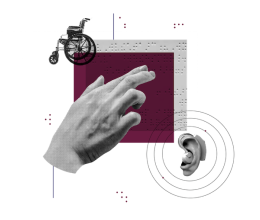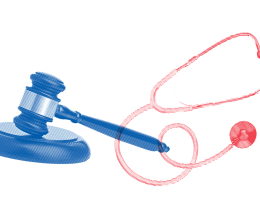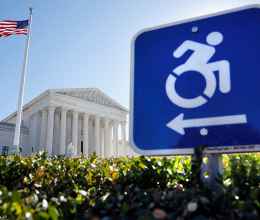Civil Rights Organizations File Brief in Acheson Hotels, LLC v. Deborah Laufer Urging Supreme Court to Hold That Civil Rights Tester Has Standing to Sue Over Hotel’s Discrimination Against People with Disabilities
Listen live on October 4, 10AM
WASHINGTON — Nine civil rights organizations have filed a friend-of-the-court brief urging the Supreme Court to uphold a disabled woman’s lawsuit challenging the lack of accessibility information on a hotel’s website.
The case involves Deborah Laufer, a woman from Florida who uses a wheelchair and has a visual impairment. As a civil rights “tester,” she scours hotel websites looking for violations of the Americans with Disabilities Act, which requires that hotels disclose sufficient detail on the features of their properties so that people with disabilities can know whether they can safely access them. This includes whether a person in a wheelchair can get in the door to the hotel, or into the room itself; whether the room has an accessible bathroom with grab bars and a roll-in shower; and whether the bed be at the height that it is possible to transfer to.
Laufer sued Acheson Hotels, which operates a hotel in Maine, after finding that the hotel’s website did not identify accessible rooms, provide an option for booking an accessible room, or include sufficient information on the hotel’s accessibility. Acheson Hotels moved to dismiss the case, arguing that Laufer lacked standing to sue because she had no intention of visiting the hotel. A Maine federal district court agreed, but the decision was reversed by the First Circuit of the United States Court of Appeals.
The amicus brief, filed by the NAACP Legal Defense Fund on behalf of itself, the American Civil Liberties Union, ACLU of Maine, Lawyers’ Committee for Civil Rights Under Law, Lambda Legal, and other civil rights organizations, argues that civil rights testers suffer the same dignitary harm as any other victim of discrimination, and that they have the same standing to sue when they personally experience that discrimination.
“Even if a person reasonably expects to experience discrimination in a particular place or at the hands of a particular defendant, they do not ‘manufacture’ discrimination by going to that place or interacting with that defendant. Rather, they in fact experience harm caused by the discriminator,” the brief reads.
“Maine businesses must ensure every person can participate fully and safely in public accommodations – no matter their physical abilities – just as longstanding federal law demands,” said ACLU of Maine Legal Director Carol Garvan. “Without adequate government enforcement of the ADA and other laws supporting and protecting the rights of people with disabilities, we must rely on civil rights testers to ensure businesses comply with the law. The Americans with Disabilities Act and other civil rights laws are designed to not only prevent overt discrimination, but also to allow all people to fully participate in public life, rather than be shut out and stigmatized.”






